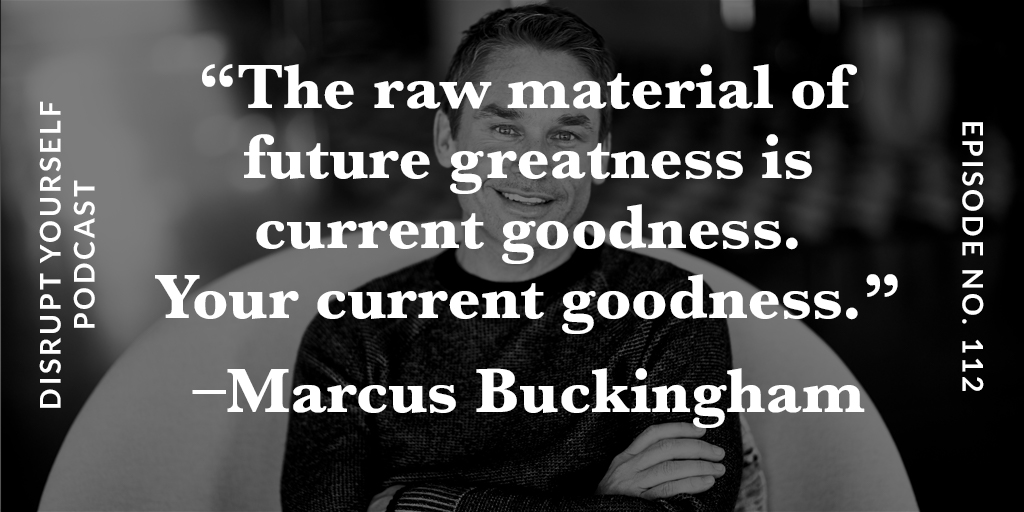My guest today is Marcus Buckingham, Best-selling author and the Head of ADP Research, People + Performance. Marcus spent almost twenty years at Gallup, and recently released Nine Lies About Work: A Freethinking Leader’s Guide to the Real World, which he co-wrote with Ashley Goodall of Cisco. His vast experience, applicable knowledge, and grounded wisdom make him a wonderful guest for this podcast.
But there’s more to the story.
Seven years ago, I wrote my first book, Dare, Dream, Do. It had been a daunting labor of love. As all published authors must eventually do, I had to send that piece of myself out into the world.
Thankfully, it didn’t go alone. Several thought-leaders and fellow authors were kind enough to read advance copies of the book and contribute a small blurb to the back cover, and Marcus’ was on the top of the stack. I am forever grateful to him for his willingness to help me, and while it may not have meant much to him at the time it meant the world to me.
One of Marcus’ strengths is knowing how to see people, and, as he did with me, having them feel that they matter. In a corporate setting, Marcus translates that into focusing on the “endearingly unique” qualities of each individual on a team.
“The power of human nature is that each human’s nature is unique. That is not a bug. That is a feature…look at the best managers…They realize that people are unique. They realize that they need to capitalize on that uniqueness. And in fact the best way to do that is to help people to refine and maximize their unique strengths.”
His new book is full of excellent advice on how to do just that.

Join us as we discuss the lies that we’ve been told about leadership, the myth of “high potential” and “low potential” people, and how performance reviews should be changed to make them effective (which they usually aren’t).
Listen on iTunes or in the player above. If you like what you hear, please leave a review!
Takeaways from this episode:
- Marcus compares being an entrepreneur, to someone wanting to go across town: it’s important to decide where you want to go, but remember that you will have many stoplights on the journey. You can’t wait until all the stoplights are green begin, or you never will. Be open to turning left and right, and keep heading “across town.”
- Tools trump training. If someone has received excellent coaching or read an amazing book on leadership but has to use tools in their day-to-day life that go against those principles, the “tools win in the end.”
- Many of the tools available today focus on “homogeneity”—making every worker as similar as possible by using a list of competencies that can be measured. We need to be willing to look outside of these competencies and find how each person can be uniquely strong.
- Work happens through teams, which often aren’t recognized on company org charts. Team leaders, to be effective, need to know what their people are like, what their people are doing today, how they are feeling, and how the team leader can help.
- “If excellence is idiosyncratic, I can’t tell you how to do it. What I can do simply is pay attention right now to what’s working with you. Because if I want you to get to great, the raw material of future greatness is current goodness. Your current goodness. Which means that the best thing I can do for you as a team leader is to pay attention to what’s currently working about your actions or activities or situations right now.”
- “People aren’t broken. We don’t need to fix them. We need to identify their unique dent in the world or dents, plural, in the world and then help them make those dents.”
- Leaders should talk to their people every week about near term future work rather than wait for an annual review. Engagement consistently measures twenty points higher when this practice is adopted. If you don’t have the time to meet with everyone then your span of control has grown too large.
- People don’t need feedback. They need attention.
- We should never separate people into “high potential” or “low potential” groups. Everyone has the ability to grow. People have momentum, not potential.
Links Mentioned in this Episode:
- Marcus Buckingham – Website | Twitter | LinkedIn
- Nine Lies About Work: A Freethinking Leader’s Guide to the Real World by Marcus Buckingham and Ashley Goodall
- Stand Out (software)
- Join Whitney’s newsletter – https://whitneyjohnson.com/newsletter
- Build an A-Team: Play to Their Strengths and Lead Them Up the Learning Curve by Whitney Johnson
- Download a free chapter from Build an A-Team

